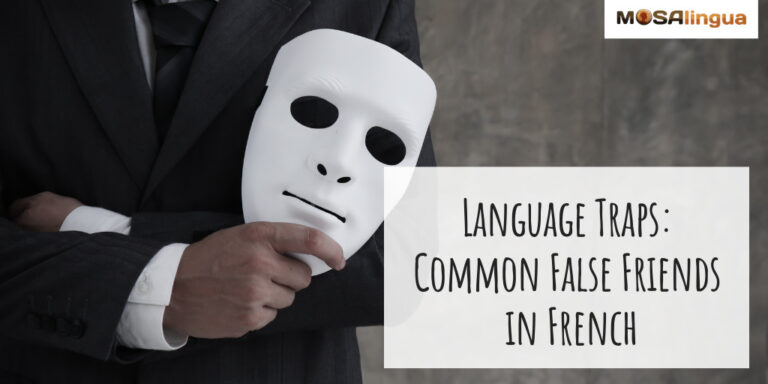Languages – we love them, we learn them, we analyze them. Some aspects are fairly straightforward to learn, while others are less simple! And unfortunately (or maybe fortunately, because it would get a little boring otherwise), there are a few “traps” that you can fall into when learning French. One such trap is French vocabulary words that closely resemble familiar English words. Some of them have the same meaning, but others are entirely different. If you’re learning French, it’s definitely worth taking the time to learn the most common false cognates in French. I guarantee that it will help you avoid confusing and/or embarrassing conversations. Keep reading to learn more!

Memorize This List of False Cognates in French to Avoid Miscommunication
Contrary to what you might think, the term false friends does not refer to a failed friendship, but rather a group of French words that closely resemble English words. More specifically, these are words that look like they should mean the same thing in both English and French – but instead, they have very different definitions.
As a result, these false cognates in French can be very confusing for beginners. And to make matters even trickier, these false friends exist in all categories of vocabulary, from emotions to food and from travel to work.
So, to help you navigate around these potential mistakes, we’ve put together several lists of false cognates in French, organized by category. We definitely recommend that you take the time to learn these sooner, rather than later. If you need a few tips to help brush up your memorization skills, our instructor Mirari has you covered. Check out her video on memorization techniques on YouTube!
Where do false cognates come from?
Before we start, let’s talk a little bit about where “false friends” come from. In fact, English/French false cognates do share a common root. As I’m sure you know, both languages have been evolving for hundreds of years. Both have also been heavily influenced by other languages. Modern French, for example, is rooted mostly in Latin and Greek. However, there are also many words that have been borrowed from other tongues like Celtic, Arabic, Germanic languages, etc.
The English language has had a similar evolution. Its roots are largely Germanic, but it has been influenced heavily by Latin, old French, other Germanic languages, and more. This is why two words that look similar might mean entirely different things.
For example, the old French term jornee (which meant both “voyage” or “a day’s labor”) has in modern French become “journée” (= day). The English word “journey” however, focuses more on the concept of travel.
We decided to create a few lists with examples that would be useful for beginners to know. I know you probably won’t memorize them all right away. But it’s helpful even just to be aware that you can’t always trust a word that looks familiar! Using the wrong word in a conversation can definitely be embarrassing, or downright confusing if the other person can’t understand what you’re trying to tell them.
So, to help you avoid these situations, here are a few (non-exhaustive) lists of the most common French/English false friends.
Start improving your French today
Good news: we can help!
More good news: you can get started for free! With your free trial, you can test drive the most effective method for learning French for the next 15 days!
Vocabulary flashcards, videos with subtitles, audiobooks, articles adapted to your level – with MosaLingua Premium (Web & Mobile), you’ll have access to all this and more. Get started right now. It’s free—and risk-free—to try!
1. False cognates in French – Emotions
To make these lists easier to navigate, the French words are in bold. The first column provides the English word, then its English definition follows for reference.
| English Word | English Definition | French Word | French Definition |
|---|---|---|---|
| to cry | to weep | crier | to shout, to scream |
| gentle | soft, delicate | gentile | kind, nice |
| to injure | to hurt, to wound | injurier | to insult [someone] |
| jolly | happy, agreeable | joli | pretty |
| miserable | very sad, in pain | misérable | very poor |
| pain | discomfort, aching | pain | bread |
| sensible | reasonable, practical | sensible | sensitive |
| misery | extreme suffering | misère | poverty |
| confidence | faith in oneself | une confidence | a secret |
2. Expressions
| English Word | English Definition | French Word | French Definition |
|---|---|---|---|
| actually | in fact, in reality | actuellement | currently |
| chance | at random | chance | luck |
| eventually | finally | éventuellement | possibly |
3. Leisure/Travel
| English Word | English Definition | French Word | French Definition |
|---|---|---|---|
| character | fictional person, an individual's conduct | caractère | personality |
| journey | voyage | journée | day |
| library | place to rent books | librairie | bookstore |
| license | driving permit | licence | undergraduate degree |
| location | specific place | location | renting |
| novel | work of fictional literature | nouvelle / nouvelles | short story / news, updates |
| camera | photographic camera | caméra | movie camera |
4. School/Work
| English Word | English Definition | French Word | French Definition |
|---|---|---|---|
| agenda | program of events | agenda | diary, calendar |
| college | university | collège | middle school, junior high school |
| delay | tardiness | délai | deadline, set period of time |
| lecture | presentation | lecture | reading |
| to pass an exam | to succeed at an exam, to get a good grade | passer un examen | to take an exam |
| sale | a transaction, purchase of items at a lower cost | sale | dirty |
| to rest | to relax, to not work | rester | to stay in one place |
| to retire | to stop working due to age | (se) retirer / retirer | to withdraw, to remove |
| reunion | to bring a group of people together, often after a long time apart | réunion | a meeting |
| figure | a number | figure | a face |
| society | a community | société | a company, a firm |
| benefits | advantages | bénéfices | profits |
5. Daily Life
| English Word | English Definition | French Word | French Definition |
|---|---|---|---|
| affair | a romantic relationship | affaires | business |
| ability | capacity, aptitude | habileté | dexterity |
| billion | one thousand million [1,000,000,000] | billion | trillion [1,000,000,000,000] |
| change | coins | changer | to switch |
| to complete | to finish | complet | full (adj.) |
| evidence | proof | évidence | obviousness, something obvious |
| habit | a familiar action | habits | clothes |
| preservatives | anti-aging ingredients | préservatif | condoms |
| to regard | to consider | regarder | to watch |
| smoking | consuming cigarettes, etc. | smoking | dinner jacket (UK); tuxedo (US) |
| surname | last name | surnom | nickname |
| petrol | gas | pétrole | oil, petroleum |
| fabric | cloth material | une fabrique | a factory |
| hazard | risk, danger | hasard | chance, coincidence |
6. Other Verbs
| English Word | English Definition | French Word | French Definition |
|---|---|---|---|
| to achieve | to attain, to succeed | achever | to finish |
| to attend | to go to an event, to accompany someone | attendre | to wait |
| to chant | to speak rhythmically | chanter | to sing |
| to demand | to require | demander | to ask |
| to fume | to be very angry | fumer | to smoke |
| to reclaim | to take something back, to restore | réclamer | to demand |
| to resume | to continue, to start again | résumer | to sum up |
| to support | to provide reinforcement | supporter | to bear, to tolerate |
| to transpire | to occur | transpirer | to sweat |
7. Other Adjectives
| English Word | English Definition | French Word | French Definition |
|---|---|---|---|
| ancient | very old | ancien | old, former |
| comprehensive | complete | compréhensif | understandable |
| effective | competent, productive | effectif | a headcount, a workforce |
| engaged | active, betrothed | engagé | committed |
| fortunate | lucky | fortuné | wealthy |
| grand | majestic, large | grand | big, tall |
| inconvenient | cumbersome | inconvénient | disadvantage |
| inhabited | populated, lived-in | inhabité | uninhabited |
| intoxicated | drunk | intoxiqué | poisoned |
| proper | correct, elegant | propre | clean |
| solvable | fixable | solvable | solvent |
How Should I Learn False Cognates in French?
Unfortunately, there’s no silver bullet for learning this vocabulary – you just have to do it. Pure and simple memorization is the best way. That being said, though, don’t worry too much about committing these lists to memory ASAP. Instead, I familiarize myself with new words, then test myself when I run into them out in the world. I worry more about internalizing their meaning and reviewing them once they’ve proven to be useful. You have a few different options for taking this approach:
- Reading: this offers you the advantage of exposure to new vocabulary in context. The words in the lists above are mostly common. As a result, you’re likely to read them sooner or later, and repeated exposure will help you retain them more easily. You can also refer back to this list at any time to refresh your memory.
- Watching movies and TV shows: above all, this is a fun activity! But it’s also one that can give you a good glimpse into everyday French, where you’re sure to find some false friends lurking! Be sure to check out our article How to Learn French with Netflix to make sure you’re getting the most out of your time!
- Listening to podcasts or radio: just like with television, French podcasts and radio are a great opportunity to improve your French listening skills. They will also expose you to all kinds of new vocabulary.
- Speaking with francophones! This is one of the best ways to improve your French. If you don’t know any French speakers, or if you don’t know how to get started, have a look at our article How to Find Conversation Partners. The goal is to find someone with whom you can share conversations as well as specific goals – like learning false cognates in context.
Tips to Take It Further
Learning false cognates in French is super valuable! But if you’re just getting started, there you might want to explore a few other avenues for learning important vocabulary as well:
- Language Similarities: Just How Close are English and French?
- French Phrases: Which to Learn and Which to Forget
- Ones to Avoid, Ones That Will Trick You, Ones That You’ll Never Be Able to Pronounce: The Most Annoying French Words
And of course, you can also find all these false friends and more in the “How to Avoid the Most Common Mistakes in French” category on our MosaLingua Premium (Web & Mobile) platform. This method will help you learn vocabulary at your own speed, when you want, no matter where you are. Plus, get tons of audio and visual resources that are very valuable during the learning process. Try it for free for 15 days – you have nothing to lose!
Try the MosaLingua Premium (Web & Mobile) free trial





Comments